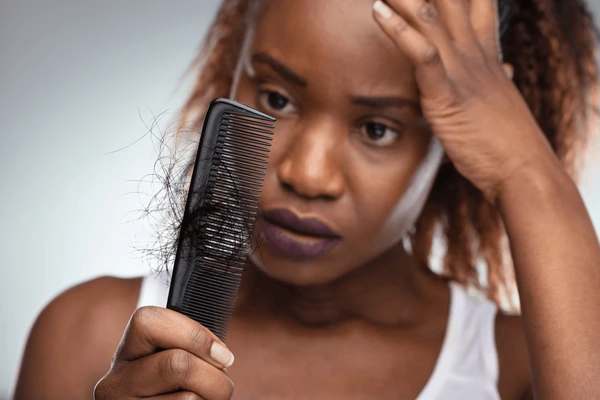Hair Loss Due to Hormonal Problems: Fast Solutions
Hair loss is a problem that affects many people, both men and women. Although there are various causes that can trigger this problem, hormonal problems are one of the main causes of hair loss.
Hormonal imbalances can be caused by various factors, such as age, stress, diet, and lifestyle. These problems can affect the production of hormones such as testosterone, estrogen, and progesterone, which can cause hair loss.

Fortunately, there are effective solutions to treat hair loss caused by hormonal problems. These treatments may include diet and lifestyle changes, medications, and hormone replacement therapies.
In this article, we will explore the causes of hair loss related to hormonal problems, as well as the different solutions available to treat this problem. From dietary changes to hormone therapy, you will discover the most effective options to combat hair loss and regain healthy, strong hair.
Fight hair loss hormonally
Hair loss is a very common problem that affects many people, especially men and women over 50 years of age. Although there are various causes that can cause hair loss, one of the most important factors is hormonal imbalances.
When we talk about hormonal hair loss, we are referring to the action of androgen hormones, which are responsible for regulating hair growth on the scalp. In some cases, excess of these hormones can cause a decrease in the size of hair follicles, resulting in gradual hair loss.
Fortunately, there are several ways to combat hair loss hormonally. One of the most effective options is to use medications that act directly on androgen hormones. These medications, known as 5-alpha reductase inhibitors, prevent the conversion of testosterone to dihydrotestosterone (DHT), a hormone that contributes to hair loss.
Another alternative is the use of topical treatments, such as lotions or shampoos, that contain active ingredients that block the action of androgen hormones on the scalp. Some of these ingredients include minoxidil, spironolactone, and ketoconazole.
In addition to these treatments, it is also important to keep in mind some healthy habits that can help prevent hormonal hair loss. For example, maintaining a balanced diet rich in nutrients such as iron, zinc, and vitamins B and C, can strengthen hair follicles and promote healthy hair growth.
Finally, it is important to note that hormonal hair loss is a problem that requires proper diagnosis and treatment by a health professional. If you are experiencing significant hair loss, it is important that you consult a dermatologist or endocrinologist to determine the exact cause and receive the most appropriate treatment for your case.
Do not hesitate to seek professional help and take measures to prevent and treat this problem effectively.
Effective treatment for hormonal hair loss
Hair loss is a problem that affects many people, both men and women. Although there are various causes, including genetics, stress and poor diet, in some cases hair loss is related to hormonal problems.
Androgenetic alopecia is one of the most common types of hair loss in men, and is caused by excessive sensitivity to the hormone dihydrotestosterone (DHT). In women, hormonal hair loss may be related to polycystic ovary syndrome or menopause.
If you are experiencing hair loss related to hormonal problems, it is important that you go to a specialist to diagnose and prescribe the appropriate treatment. However, there are several effective treatments that can help you stop hair loss and promote hair growth.
Medical treatments
One of the most effective medical treatments for hormonal hair loss is the use of finasteride, a medication that blocks the production of DHT in the body. Other medications may also be used such as minoxidil, which promotes hair growth, or corticosteroids, which reduce inflammation in the scalp.
In some cases, hormone therapy may be chosen to treat underlying hormonal problems that are causing hair loss. For example, in women with polycystic ovary syndrome, the birth control pill or spironolactone can be used to regulate hormone levels.
Natural treatments
In addition to medical treatments, there are several natural remedies that can help stop hormonal hair loss. Some of them include:
- Vitamin supplements: some supplements such as biotin, iron, and vitamins B and D can improve hair health and stop hair loss.
- Essential oils: Some oils such as rosemary oil and lavender oil can stimulate hair growth and reduce inflammation on the scalp.
- Changes in diet: a balanced diet rich in proteins, vitamins and minerals can improve hair health and reduce hair loss.
It is important to note that natural treatments can be effective, but they are not a miracle solution. If you are experiencing hormonal hair loss, it is important that you consult a specialist for the appropriate treatment.
Control hormonal hair loss effectively
Hair loss is a problem that affects many people and can have different causes, including hormonal problems. Androgenic alopecia is one of the most common causes of hair loss in men and women, and is related to hormone levels.
If you are experiencing hair loss due to hormonal problems, don’t worry, there are solutions that can help you control the situation. Below, we present some recommendations so that you can effectively control hormonal hair loss.
Change your diet
A balanced diet is essential to maintain healthy and strong hair. Some nutrients that are important for hair are protein, B vitamins, iron, and zinc. If your diet is not balanced, you may be suffering from a nutrient deficiency that can affect the health of your hair.
It is important that you include foods rich in these nutrients in your diet, such as lean meats, fish, eggs, legumes, nuts, green leafy vegetables and fruits.
Use appropriate products
It is important that you use products appropriate for your hair type and the situation you are experiencing. There are specific products for hair loss, such as shampoos, conditioners and treatments that can help strengthen your hair and prevent hair loss.
It is also important that you avoid using harsh chemicals, such as dyes and perms, as they can damage the hair and make the situation worse.
Consult with a specialist
If you are experiencing hair loss due to hormonal problems, it is important that you consult with a dermatology or trichology specialist. They will be able to determine the cause of your hair loss and recommend an appropriate treatment.
In some cases, the use of medications that regulate hormonal levels may be necessary to stop hair loss. It is always important to follow the recommendations of a specialist and not self-medicate.
Maintain good hair hygiene
It is important that you maintain good hair hygiene to avoid the build-up of sebum and dirt on the scalp, which can clog hair follicles and cause hair loss.
Wash your hair frequently and use gentle products that do not irritate the scalp. It is also important that you avoid using brushes and combs that can damage the hair and scalp.
Reduce stress
Stress can negatively affect hair health as it can cause excessive hair loss. It is important that you do activities that help you reduce stress, such as yoga, meditation, walking or any activity that relaxes you.
It is also important that you get enough sleep and maintain good quality sleep so that your body can recover properly and your hair is healthy.
Read Also: How to Take Care of Your Hair at Home
In summary, hair loss due to hormonal problems is a common problem that affects many people. Fortunately, there are effective solutions to treat this problem, from diet and lifestyle changes to medical treatments. If you are experiencing significant hair loss, it is important to consult with a doctor to determine the underlying cause and find the best solution for you.
With a little patience and perseverance, you can regain the health of your hair and feel better about yourself. Go ahead, take control of your hair and get back to feeling confident and radiant!



![Benefits Of Hydration For Dry Skin [+Guide On How To] 5 Benefits Of Hydration For Dry Skin](https://naijaxtremefashion.com/wp-content/uploads/2022/08/benefits-of-hydration-for-dry-skin-min.jpg)


